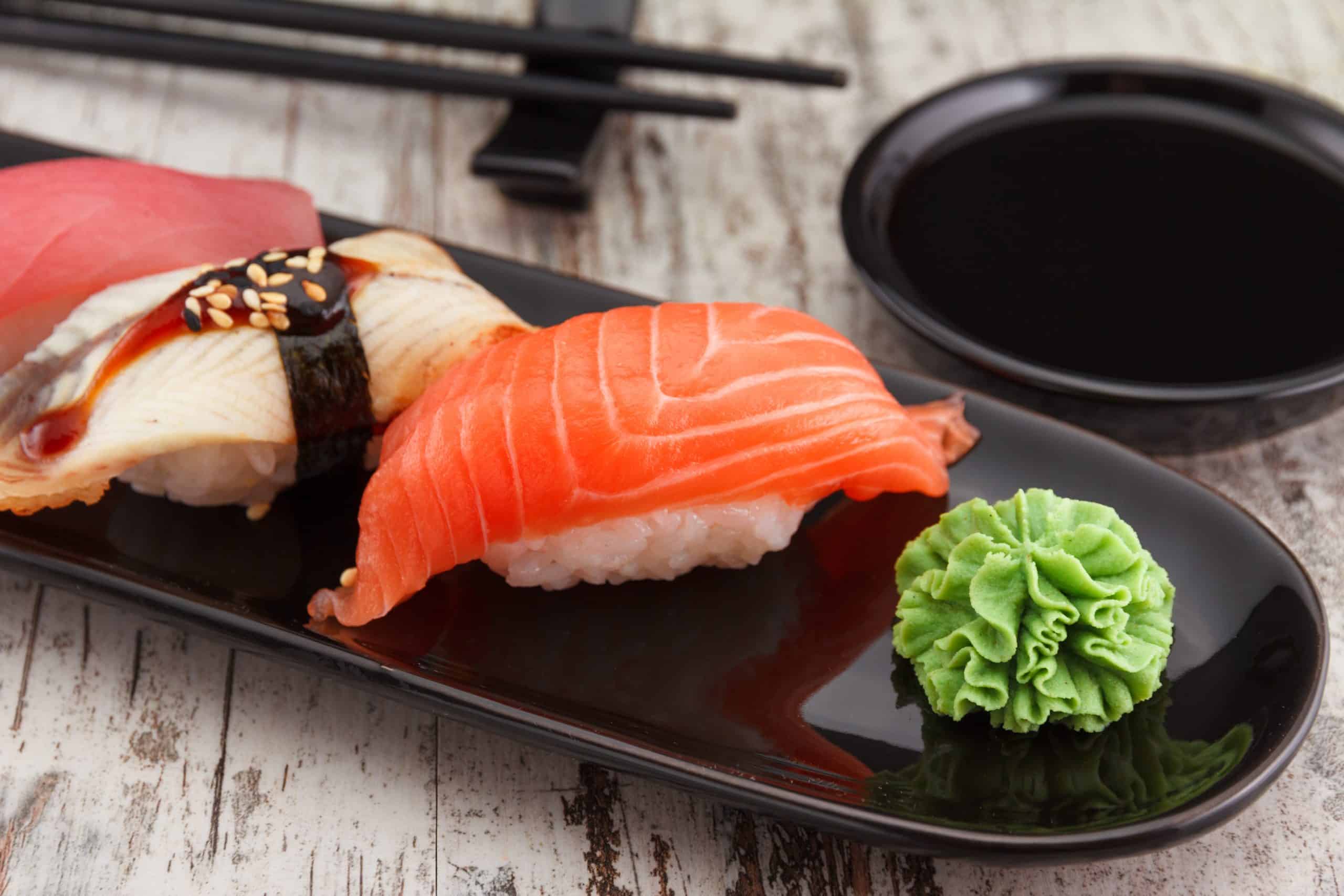Do you love spicy food but wonder whether it adds to a healthy lifestyle? Spicy foods like wasabi root may offer nutritional benefits to prolong your life and keep you fit. Fortunately, wasabi health benefits welcome the marriage of spicy food passions and healthy eating. The potential health benefits of wasabi are said to range from cancer prevention to osteoporosis treatment, to mention some. That said, we only want to talk about the facts. How then, can wasabi benefit your health? Let’s find out how it could support a healthier lifestyle for you.
Get your personalized
meal plan!
Different Types Of Wasabi
Wasabi is a spicy Japanese condiment made from a root that strikes the olfactory senses in a different way than the spicy elements of chilies. You can find four common products of wasabi that offer edible benefits.
- Wasabi root is the original Japanese plant.
- Wasabi paste is the typical condiment you eat with sushi, and it isn’t always pure wasabi root extract.
- Wasabi peas are roasted green peas smothered in salt, oil, sugar, and wasabi powder.
- Genuine Japanese wasabi powder becomes wasabi paste. The Washington Post claims that unfortunately many wasabi pastes and condiments in America aren’t authentic (18).
The main ingredients in most wasabi products are similar, leading to each type providing possible health advantages identical to each other.
I’ll use studies to advise you about the potential properties of different wasabi products. However, the compounds that may provide each health factor come from all types. Please note, some wasabi types also have pitfalls. Let’s first look at the wasabi root nutrition information.
Wasabi Nutritional Information
Pure wasabi root has excellent nutritional information about its health benefits. According to the USDA, one. cup of chopped, raw wasabi root contains (7):
| Nutrition Item | Amount | Unit |
|---|---|---|
| Energy | 142 | kcal |
| Protein | 6.24 | g |
| Fiber | 10.1 | g |
| Calcium | 166 | mg |
| Iron | 1.34 | mg |
| Phosphorus | 104 | mg |
| Potassium | 738 | mg |
| Sodium | 22.1 | mg |
| Zinc | 2.11 | mg |
| Vitamin C | 54.5 | mg |
| Thiamin | 0.17 | mg |
| Vitamin B-6 | 0.356 | mg |
Read More: Your Guide To Horseradish Health Benefits
What Are The Health Benefits Of Wasabi?
The possible health benefits of wasabi are said to be extensive, but you must know that not all wasabi products are equal. Wasabi paste, powder, and root have the same possible benefits only if they come from genuine Japanese wasabi roots. That said, wasabi peas may offer fewer benefits.
What Health Benefits Does Wasabi Have?
Products derived from Japanese wasabi roots are thought to have various wasabi health benefits for making spicy food lovers happy to make healthier lifestyle choices.
A Magic Ingredient: Wasabi May Reduce Cancer Risk
Wasabi is a cruciferous vegetable containing glucosinolates responsible for the pungent odor (9). A study by the Gazi University in Turkey and four others found that cruciferous vegetables with these compounds may reduce the risk of colorectal cancer (4).
A Healthy Gut: Wasabi May Alter Gut Bacteria And Prevent High Blood Pressure
The University of Queensland studied wasabi’s benefits on the gut microbiome of rats (17). Supplementation with wasabi powder in rats with diet-induced obesity was found to alter the gut microbiome and prevent the development of hypertension. It’s important not to overstate the implications for humans, however – this was only one animal study..
An Antimicrobial Gem: Wasabi Fights Food Poisoning
Eating Sashimi and Sushi may lead to food poisoning, even if the raw seafood dishes are healthy for other reasons (11). Meanwhile, wasabi may help prevent food poisoning, according to the Universitas Sumatera Utara in Indonesia (3). Wasabi was found to have an antimicrobial effect against harmful bacteria. It’s not foolproof though, so you should still ensure that if you eat raw fish it has been handled properly, and avoid it if you are recommended to for any medical reason.
An Anti-Inflammatory: Wasabi May Reduce Chronic Disease Risk
Unfortunately, uncontrolled inflammation can increase the risk of certain chronic diseases such as heart disease, inflammatory bowel disease and osteoporosis (10, 14). Gachon and Seoul National Universities found that wasabi extract acted as an anti-inflammatory in a model system of colitis (inflammation of the colon) (21).
If you’ve mustered up the courage to crush your weight loss goal, let Betterme take the sting out of this demanding process. Our app will help you restructure your habits, remold your life and crank up your fitness results!
Wasabi Peas Health Benefits
Wasabi peas are a fun and potentially healthier-than-most snack for spicy food lovers. Fortunately, they also contain wasabi powder, so you can still get some of the possible benefits of wasabi root. However, they can also have lousy nutrition values.
A Potent Antioxidant: Wasabi Peas May Reduce Disease Risk
Wasabi peas contain antioxidants like the condiment, because they contain wasabi root powder. The Ohio State University and Wuhan Universities studied the many benefits of antioxidants on the body (16). Antioxidants in general may help reduce your risk for heart disease, Alzheimer’s, cancer, and respiratory disorders.
A Fibrous Hero: Wasabi Peas May Help Stabilize Blood Sugar Levels
Wasabi peas can be an excellent snack for people with diabetes because they contain fiber. The University of Otago found that increased fiber intake helps to stabilize a diabetic patient’s blood sugar levels (5). Moderation is the key because wasabi peas may also contain added sugars and unhealthy fats. Check the nutrition facts label if you aren’t sure..
Bonus: Fake Wasabi Health Benefits
Many restaurants use fake wasabi because the genuine root and extract are too expensive (18). However, fake wasabi is mustard powder, green food coloring, horseradish, and cornstarch.
Meanwhile, the horseradish used in fake wasabi has benefits too. Let’s see what health benefits fake wasabi has.
No More Sniffing: Fake Wasabi May Help Fight Sinus and Urinary Tract Infections
Many people have traditionally used horseradish as a home remedy to help clear sinuses and fight UTIs. It may be a helpful adjunct therapy with not much risk in trying, but it cannot replace any treatment or medication prescribed by your doctor.
Healthy Mouths: Fake Wasabi May Enhance Oral Health
The horseradish found in fake wasabi is also an antimicrobial which can defend your body and mouth against harmful bacteria. Gangneung-Wonju National University tested isothiocyanates extracted from horseradish root against several strains of oral bacteria and found it effective (1). Like genuine wasabi, fake wasabi also has some antibacterial action.
Read More: Ceylon Cinnamon Health Benefits: Is It Safe To Consume?
FAQs
What Are Other Names For Wasabi Root?
Wasabi root has various formal names, including Eutrema japonica, Eutremia wasabi, Gochunaengi, Japanischer Meerrettich, Cochlearia wasabi, and Wasabia japonica. Meanwhile, another informal name for wasabi is Japanese horseradish (19).
How Will I Know If Wasabi Is Real Or Fake?
One sure-fire method for telling whether you’re purchasing genuine or fake wasabi: the price. Fake wasabi sells for the same price as regular condiments in the supermarket. However, genuine wasabi root products cost a fortune.
For example, you’ll pay $11 or more for an ounce of genuine wasabi (8). The exorbitant prices result from the difficulty growing wasabi root. BBC News calls wasabi the hardest-growing plant (24). The plant’s growth needs are specific enough to make it pricy.
Therefore, you’ll only find genuine wasabi products if you’re willing to pay for the highly-sought after root.
Are Wasabi Peas Genuinely Healthy?
Wasabi peas’ health benefits do exist, but its high-calorie counts can outweigh them. Undoubtedly, wasabi peas have high amounts of protein and fiber (23). These benefits make it a much healthier snack than candy bars or chips.
However, wasabi peas can be made with added sugars and unhealthy fats. This is fine in moderation but it’s always good not to overdo it. Check the nutrition facts label to find a product that best suits your needs and preferences.
Reasons why BetterMe is a safe bet: a wide range of calorie-blasting workouts, finger-licking recipes, 24/7 support, challenges that’ll keep you on your best game, and that just scratches the surface! Start using our app and watch the magic happen.
Wasabi Health Benefits: The Bottom Line
Potential wasabi health benefits offer true value to spicy food lovers who follow healthy lifestyles. I personally welcome any food suggested to have health advantages. In addition, I enjoy spicy dishes and aromatic experiences. Interestingly, wasabi burns the nose more than the tongue.
Wasabi root, peas, and paste can be excellent for healthy lifestyle choices. However, I’ve always understood that moderation controls the potential setbacks of any food. Eat wasabi as a healthy snack or condiment in moderation, and avoid it if your healthcare provider advises you to for any medical reason.
DISCLAIMER:
This article is intended for general informational purposes only and does not serve to address individual circumstances. It is not a substitute for professional advice or help and should not be relied on for making any kind of decision-making. Any action taken as a direct or indirect result of the information in this article is entirely at your own risk and is your sole responsibility.
BetterMe, its content staff, and its medical advisors accept no responsibility for inaccuracies, errors, misstatements, inconsistencies, or omissions and specifically disclaim any liability, loss or risk, personal, professional or otherwise, which may be incurred as a consequence, directly or indirectly, of the use and/or application of any content.
You should always seek the advice of your physician or other qualified health provider with any questions you may have regarding a medical condition or your specific situation. Never disregard professional medical advice or delay seeking it because of BetterMe content. If you suspect or think you may have a medical emergency, call your doctor.
SOURCES:
- Antimicrobial activity of isothiocyanates (ITCs) extracted from horseradish (Armoracia rusticana) root against oral microorganisms (2013, pubmed.ncbi.nlm.nih.gov)
- Antimicrobial Packaging Systems (2013, sciencedirect.com)
- Antimicrobial Effect of Wasabia japonica or Wasabi on Raw Salmon in Served Sashimi at Japanese Restaurants in Medan | International Journal of Medical Science and Clinical Invention (2018, valleyinternational.net)
- Cruciferous Vegetables and Their Bioactive Metabolites: from Prevention to Novel Therapies of Colorectal Cancer (2022, ncbi.nlm.nih.gov)
- Dietary fiber and whole grains in diabetes management: Systematic review and meta-analyses (2020, pubmed.ncbi.nlm.nih.gov)
- Efficacy and safety profile of a herbal drug containing nasturtium herb and horseradish root in acute sinusitis, acute bronchitis, and acute urinary tract infection in comparison with other treatments in the daily practice/results of a prospective cohort study] (2006, pubmed.ncbi.nlm.nih.gov)
- Food Data Central (2019, fdc.nal.usda.gov)
- How Much Does Real Wasabi Cost? (2022, hioft-gourmet.com)
- Important Odorants of Four Brassicaceae Species, and Discrepancies between Glucosinolate Profiles and Observed Hydrolysis Products (2021, researchgate.net)
- Inflammation: what is it, and how does it affect the heart? (2021, bhf.org.uk)
- Is Sushi Safe to Eat? 5 Tips for Safer Sushi (2018, share.upmc.com)
- Is There Such a Thing as “Anti-Nutrients”? A Narrative Review of Perceived Problematic Plant Compounds (2020, ncbi.nlm.nih.gov)
- Is Cornstarch Bad for You? Nutrition and Health Effects (2020, healthline.com)
- Osteoporosis, inflammation, and aging (2005, ncbi.nlm.nih.gov)
- Pharmacokinetics, Tissue Distribution, and Anti-Lipogenic/Adipogenic Effects of Allyl-Isothiocyanate Metabolites (2015, pubmed.ncbi.nlm.nih.gov)
- Role of ROS and Nutritional Antioxidants in Human Diseases (2018, pubmed.ncbi.nlm.nih.gov)
- The influence of wasabi on the gut microbiota of high-carbohydrate, high-fat diet-induced hypertensive Wistar rats (2021, pubmed.ncbi.nlm.nih.gov)
- The wasabi sushi restaurants serve is pretty much never actual wasabi (2014, washingtonpost.com)
- Wasabi | Description, Uses, Real, & Facts (2020, brittanica.com)
- Wasabi (Eutrema japonicum) Reduces Obesity and Blood Pressure in Diet-Induced Metabolic Syndrome in Rats (2022, ncbi.nlm.nih.gov)
- Wasabia japonica is a potential functional food to prevent colitis via inhibiting the NF-κB signaling pathway (2017, pubmed.ncbi.nlm.nih.gov)
- WASABI: Overview, Uses, Side Effects, Precautions, Interactions, Dosing and Reviews (n.d., webmd.com)
- Wasabi Peas: Nutrition, Uses, Benefits, and Downsides (2022, healthline.com)
- Wasabi: Why invest in ‘the hardest plant to grow? (2014, bbc.com)










